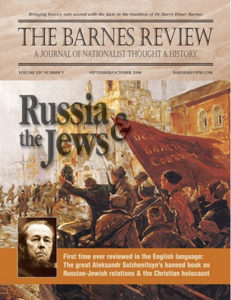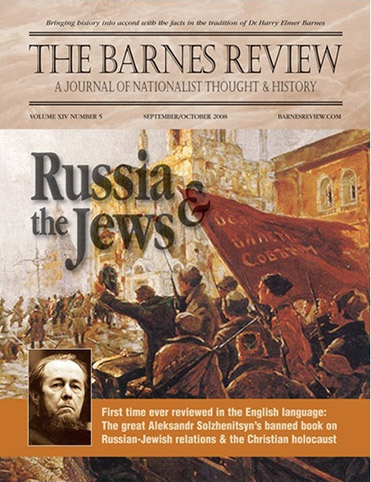Description
 The Barnes Review, September/October 2008: Russia and the Jews
The Barnes Review, September/October 2008: Russia and the Jews
VOLUME XIV, NUMBER 5
THE JEWS IN THE SOVIET UNION
By John Tiffany. This edition of TBR is entirely devoted to one of the most important books on the Russian Revolution and the Bolshevik era ever to be written: Aleksandr Solzhenitsyn’s The Jews in the Soviet Union.
Together with part one, Russian Jewish History: 1795-1916, they comprise Solzhenitsyn’s massive—and suppressed—200 Years Together. We’re reviewing The Jews in the Soviet Union this issue because, as far as we know, this is the first and only full-length review of the book ever to appear in the English language.
Distinguished Revisionist historian Udo Walendy reviewed Solzhenitsyn’s The Jews in the Soviet Union in his magazine Historische Tatsachen (“Historical Facts”). Our English translation of that scholarly review—with many great photos added—comprises this September/October 2008 issue. We think it’s a blockbuster.
As Solzhenitsyn himself put it: “After 1917 life and people [in Russia] changed greatly. But literature produced a very poor reflection of these changes. The truth was suppressed and lies encouraged. Thus we arrived in the 1990s knowing next to nothing about this country. This explains the great number of surprises.”
The German magazine Der Spiegel asked the great writer:
Your recent two-volume work 200 Years Together was an attempt to overcome a taboo against discussing the common history of Russians and Jews. These two volumes have provoked mainly perplexity in the West. You say the Jews are the leading force of global capital and they are among the foremost destroyers of the bourgeoisie. Are we to conclude from your rich array of sources that the Jews carry more responsibility than others for the failed Soviet experiment?
Solzhenitsyn replied:
I avoid exactly that which your question implies: I do not call for any sort of scorekeeping or comparisons between the moral responsibility of one people or another; moreover, I completely exclude the notion of responsibility of one nation toward another. All I am calling for is self-reflection. You can get the answer to your question from the book itself: Every people must answer morally for all of its past—including that past which is shameful. Answer by what means? By attempting to comprehend: How could such a thing have been allowed? Where in all this is did we go wrong? And could it happen again?
It is in that spirit, specifically, that it would behoove the Jewish people to answer, both for the revolutionary cutthroats and the ranks willing to serve them. Not to answer before other peoples, but to oneself, to one’s conscience, and before God. Just as we Russians must answer—for the pogroms, for those merciless arsonist peasants, for those crazed revolutionary soldiers, for those savage sailors.
Nobel Prize Winner’s Writings Still Banned
By Udo Walendy. Aleksandr Isaevich Solzhenitsyn has proved to be without doubt both a very important and industrious writer. He was born on December 11, 1918 in Kislovodsk, Stavropol Krai, Russia. While an artillery captain in the Red Army, he was arrested in February 1945 in East Prussia because of an exchange of letters that criticized Josef Stalin between the lines and that was zealously read by political monitors.
For 8 years, from 1945 through 1953, he suffered through the work camps of the gulag and then spent three more years in an internal banishment region of Kazakhstan. Afterward, he was a mathematics teacher. Assured of government approval by Nikita Khrushchev (the communist head of state after Stalin) who had introduced a free-speech period or “thaw,” he released in 1962 his fictionalized account One Day in the Life of Ivan Denisovich, the first Soviet work of literature about Stalin’s punishment camps. It was translated immediately into numerous languages.
Then new attacks and persecution began. None of his important novels after Ivan Denisovichwas allowed to appear in the Soviet Union: Cancer Ward (1968); The First Circle of Hell (1968);The Gulag Archipelago (three volumes in most printed editions, 1973-1978); and a cycle of novels called The Red Wheel, consisting of August 1914 (1971), November 1916 (two volumes, 1984) and March 1917 (two volumes, 1989- 1990).A fourth tome in the cycle, April 1917, is not yet translated into English.
He received the Nobel Prize for Literature in 1970, but did not dare travel to Oslo to receive it, fearing he would be banned from Russia. That same year he was in fact excluded from the Soviet Writers Federation (which readmitted him only in 1989 under glasnost). He was expelled from the Soviet Union in 1974 and lived in Vermont from 1976 to 1994. Soviet president Mikhail Gorbachev rehabilitated him in 1990 and restored his Russian citizenship.
The present discussion is concerned with the second volume of Solzhenitsyn’s two volume work. Together they are called Two Hundred Years Together. In romanized Russian, this is Dvyesti lyet vmestye.
The first volume was Russian-Jewish History 1795-1916 and ran to 512 pages, published in 2001. In 2002 the second volume appeared, a 600-page-long investigation called The Jews in the Soviet Union. His preceding books, written in the form of novels, were often based on historical facts and personal experiences, and all could lay claim to correct and provable factuality regarding the historical events they described. As far as we know no one—apart from communist dogmatists unable to toss overboard their mendacious party dialectic—has dared attack or refute him on his facts. He merits outstanding recognition for this in view of the abundance of detail in his works.
In his book The Jews in the Soviet Union, Aleksandr Solzhenitsyn has once again opened up for us a multiplicity of Russian sources that previously had been inaccessible or unevaluated in German-speaking countries.
His Two Hundred Years Together series abandoned his usual form of fiction in favor of scientific analysis. Possibly this was also due to the controversial topic: Jewish power and anti-Semitism. There is only one problem with this otherwise excellent book, chapter nine, “At War with Germany.”
Chapter nine should also have received his usual comprehensive documentary analysis. But here we cannot avoid the reproach, to be detailed later, that the Nobel Prize-winning Solzhenitsyn, whom we otherwise profoundly respect, copied for this chapter exclusively from biased Jewish and Soviet sources, in fact mostly from state historians, without feeling compelled to undertake one single critical examination.
As an experienced analyst, he should have known that those historians, particularly with respect to Germany, had snatched up their pens in the same unanimous and unrestrained party-line spirit as communists always do for their political diatribes. A man who otherwise understands well how to differentiate between propaganda and reality, and between censorship and freedom of expression, has here lost his impartiality when confronted with the extensive complexity of German history.
In his Gulag Archipelago he confessed:
“How easily did we let zealous [Stalinist] slogans lead us about on their mental leash. How satisfied we were to regard the persons betrayed as those who were betraying!”
In volume two he describes truly horrific events that were basic Soviet practice. But regarding German war history, it does not occur to Solzhenitsyn in the least to think that he might still be on the leash of zealous propaganda.
The Jews in the Soviet Union—Part 2 of Aleksandr Solzhenitsyn’s banned book series 200 Years Together. A review by German historian Udo Walendy
8.5″×11″, saddle stitched, 72 pp., b/w illustrations

